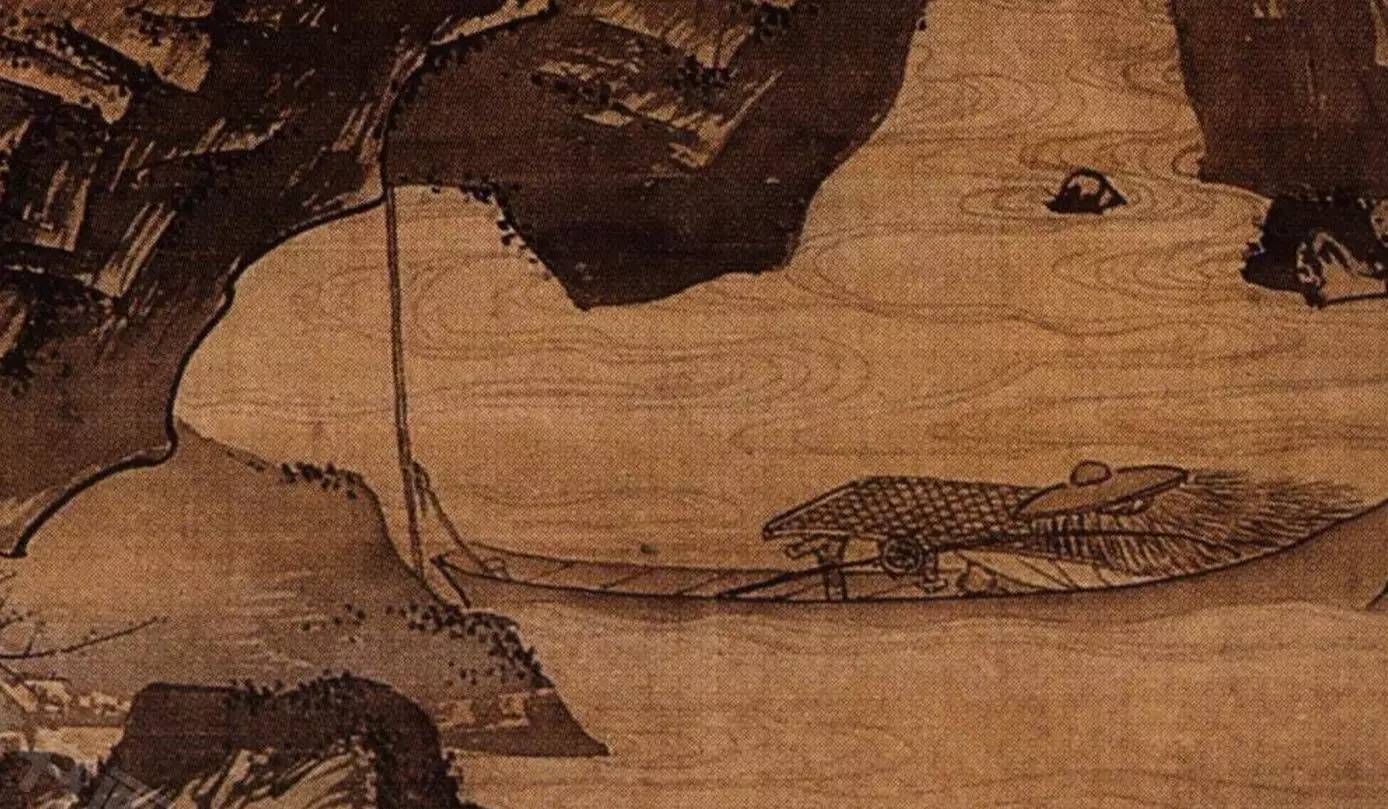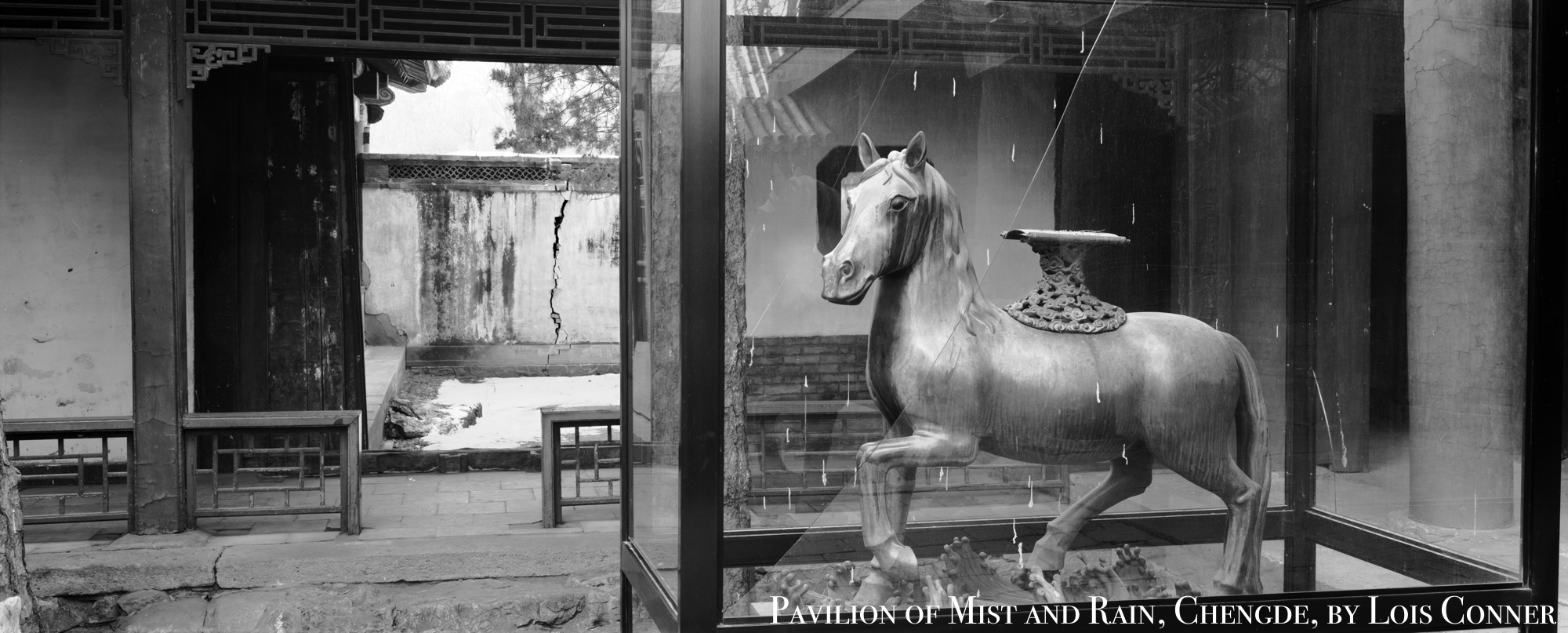Strange Tales from a Chinese Studio 聊齋誌異
A Jesting Judgement on a Cut Sleeve
And here we return to Tao Yuanming’s ‘The Peach Blossom Spring’, but in the form of a double-entendre-laden lampoon of moralists who disapproved of male-to-male anal sex, 雞姦. It comes from the pen of the early Qing fiction writer Pu Songling 蒲松齡 (1640-1715), author of Strange Tales from a Chinese Studio 聊齋誌異. As he writes in his ‘Jesting Judgement’ 笑判 to the story ‘Cut Sleeve’ 黃九郎 (in John Minford’s unswerving translation):
I have written a Jesting Judgement, which I here append, in the light of the teaching of the great sage Mencius: ‘The coming together in sexual congress of man and woman is one of the great natural bonds in human relations.’ 余有 ‘笑判’,並志之:男女居室,為夫婦之大倫。
Light and dark,
Hot and cool,
Dry and moist,
So it goes,
True counterpoint
Of Yin and Yang.
Illicit trysts
Twixt men and women
Were once thought foul;
How much fouler reeks
The passion of Cut Sleeve,
Of Half-eaten Peach,[1]
Of love twixt man and man!
Only the mightiest warrior
Can penetrate that tiny bird-track![2]
That narrow grotto
Leads to no Peach Blossom Spring:[3]
Surely the fisherman
Poled up it by mistake!
Our hero forsakes
The play of Cloud and Rain,
Turns away from
The true way
Of human consummation,
Preferring the up and down
Of manual masturbation,[4]
Yin and Yang
Widdershins,
Everything
Topsy-turvy.
He abandons the Flowery Pool,[5]
For a phony tale
Of enlightened
Sublimation of desire.
On the Grassless Terrain
Of the Barbarian Grotto,
The One-Eyed Marshal[6]
Leads the charge.
Tethering Red Hare[7]
To the Rear Gate of the Barracks,
The General
Thrusts his halberd.
Seeking to steal the Great Bow[8]
From the National Armoury,
He bursts the barrier,
In a slippery dream
A Yellow Eel wriggled
Between the student’s thighs,[9]
Omen of last night’s union.
The plums sold by Wang Rong
Were juicy but sterile,
Their stones hollowed out
To put a stop to posterity.[10]
Into the Black Pine Wood
Thunders the cavalry;
From the Yellow Dragon Palace[11]
Surges the tide.
This nefarious pestle
Should be snapped off
At its root!
This wicked passage
Should be blocked up
For ever!
燥濕互通,
乃陰陽之正竅。
迎風待月,
尚有蕩檢之譏;
斷袖分桃,
難免掩鼻之醜。
人必力士,
鳥道乃敢生開;
洞非桃源,
漁篙寧許誤入?
今某從下流而忘返,
捨正路而不由。
雲雨未興,
輒爾上下其手;
陰陽反背,
居然表裡為奸。
華池置無用之鄉,
謬說老僧入定;
蠻洞乃不毛之地,
遂使眇帥稱戈。
系赤兔於轅門,
如將射戟;
探大弓於國庫,
直欲斬關。
或是監內黃鱔,
訪知交於昨夜;
分明王家朱李,
索鑽報於來生。
彼黑松林戎馬頓來,
固相安矣。
設黃龍府潮水忽至,
何以御之?
宜斷其鑽刺之恨,
兼塞其送迎之路。

Translator’s Notes
Jesting Judgement: Pu Songling’s witty envoi, as I read it, pokes fun at the anti-homosexual lobby, in the form of a brilliant and highly lascivious parallel-prose pastiche of pedantic neo-Confucian prudery. It is roundly condemned as vulgar and obscene by no less as scholar than Zhu Qikai (see his edition, note 85, p.317), who refuses to interpret its real sense, obliging the reader only to the extent of providing the raw meaning of individual allusions (most of which he takes straight from the nineteenth-century commentator Lü Zhan’en). This strange little piece should surely be seen as a humorous counterpart to Pu Songling’s more famous tour de force, the Author’s Preface. It is certainly just as crammed with literary allusions. Judith T. Zeitlin calls it ‘an amazingly arcane and rather hostile parody in parallel prose on homosexual practices (Historian of the Strange, p.91). I find it not so much hostile, as a deliberately exaggerated spoof. …
Pu Songling’s time was one of considerable sexual tolerance. … The classic homosexual collection Tales of the Cut Sleeve was probably published during the seventeenth century. While homosexual practices are described in other stories in Strange Tales, this [‘Cut Sleeve’ 黄九郎] is the principal full-length story devoted to the love between a man and a male fox-spirit.
[1] Of Half-Eaten Peach: Mi Zixia, one of the most celebrated homosexuals in Chinese history and the favourite for a time of Duke Ling of Wei (534-493BC), ‘was strolling with the ruler in an orchard and, biting into a peach and finding it sweet, he stopped eating and gave the remaining half to the ruler to enjoy’ (Bret Hinsch, Passions of the Cut Sleeve (Berkeley, 1990), p.20).
[2] bird-track: This is playing with the expressions from the famous poe by Li Bo [701-62), ‘The Road to Shu Is Hard’: ‘West on Taibo Mountain, take a bird road there … When earth collapsed and the mountain crashed, the muscled warriors died’. [西當太白有鳥道 … 地崩山摧壯士死] (Minford and Lau, Classical Chinese Literature, I, pp.723-5). The chinese character for ‘bird’, normally read niao, when read Diao [鳥, also 屌], is a slang expression for the penis.
[3] Peach Blossom Spring: The title of the famous idyll by Tao Yuanming (365-427), in which a fisherman stumbles upon an earthy paradise. (See Minford and Lau, Classical Chinese Literature, I, pp.515-17.) The relevant passage in Tao’s original reads: ‘The fisherman left his boat and entered a grotto, which at first was extremely narrow, barely admitting his body; after a few dozen steps it suddenly opened out on to a broad and level plain.’ ‘Grotto’ [小口] was one of the standard terms for vagina.
[4] the up and down … manual masturbation: Here Pu Songling is playfully quoting from the Zuo Commentary, where a man questioning a prisoner first raises his hand, then lowers it. (See The Chinese Classics, V, pp.519-20.)
[5] Flowery Pool: Suggestive of the many expressions for the female genitalia, such as Dark Garden, Jade Terrace.
[6] One-Eyed Marshal: The One-Eyed Marshal was Li Keyong (d.908), a famous general of Turkish origin at the end of the Tang dynasty, known as the One-Eyed Dragon. (One is tempted to say One-Eyed Trouser Snake …) This literary and historical reference is full of homosexual double entendres.
[7] Red Hare: The great horse of Lü Bu (d. AD 198), General of the Eastern Han dynasty. Here it has a sexual connotation, as does the rear gate of the barracks.
[8] to steal the Great Bow: Another mischievously witty reference to the venerable Zuo Commentary, where ‘Yang Hu threw off his armour, went to the duke’s palace, and took from it the precious symbols of jade and the great bow’ (The Chinese Classics, V, p.770). It is not that hard to interpret the sexual innuendo here, bearing in mind that Jade Stalk is one of the many terms for the penis.
[9] Yellow Eel … student’s thighs: Lü Zhan’en (1825) refers to a story about the prominent Academician Wang during the Ming dynasty, who had a homosexual liaison with a student in the Imperial College. The young man dreamed of a yellow eel that appeared between his thighs.
[10] The plums sold by Wang Rong … posterity: Wang Rong (235-306), one of the Seven Sages of the Bamboo Grove (see Minford and Lau, Classical Chinese Literature, I, pp.445-6), was proverbially mean and bored holes in his plum stones so that no one else would be able to grow such a delicious variety. Here the plums are being used as a metaphor for childless homosexual relations.
[11] Black Pine Wood … Yellow Dragon Palace: Zhu Qikai (1989) follows Lü Zhan’en (1825) in interpreting these place-names sexually. The (very sketchy) contemporary paraphrase by Yuan Lükun et al. (1992, pp.288-9), which turns Pu Songling’s wit into a heavy moralistic tirade, is extremely blunt here: ‘And when the passive male partner suddenly empties his bowels, there is nothing his aggressor can do to stop it.’
— From Pu Songling, Strange Tales from a Chinese Studio, translated and edited by John Minford, Penguin Books, 2006, pp.275-276 & 538-540.

